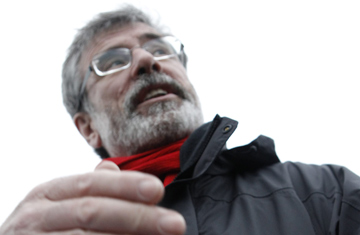
Sinn Fein President Gerry Adams canvasses in the seaside village of Laytown in County Meath February 18, 2011.
Three women huddle outside a butcher shop in Dundalk, a town in the Republic of Ireland, close to the border with Northern Ireland. "Excuse me," I ask. "I've lost Gerry Adams — has he passed you by?" Before the women can answer, the butcher comes out of his shop: "He went that way," he says, pointing. "He's a good man Gerry. He'll be good for this town, for this country. People need change."
Change is something Adams is seeing a lot of these days. As president of Sinn Fein, the political wing of the IRA, in the mid-'80s to early-'90s, he became the international face of the republican fight for independence and played a pivotal role in the Northern Irish peace process. In West Belfast he effectively had a seat for life, but had only been a peripheral figure in the Republic of Ireland's politics — until last year, when he announced that he would give up his seat as an MP in Northern Ireland and go south, to run in the Republic's Feb. 25 election. Which is how he finds himself on the campaign trail in Dundalk, surrounded by well-wishers, naysayers and people taking photos on their cell phones.
Adams, who is contesting in the Louth constituency following the retirement of TD (a member of Ireland's lower house of parliament, the Dail) Arthur Morgan, is almost sure to win the seat. But still, there's no time to relax. "I work on the basis that you never take the voter for granted," he tells TIME. "People may be glad to see you [campaigning], but it's on the day that you need people out there." His cautious optimism is understandable — the switch into politics south of the border won't be easy.
While Sinn Fein is a credible part of government in the North, it is almost guaranteed to be in opposition in the Republic, sidelined as it is by the three main political parties, Fine Gael, Labour and Fianna Fail, which are polling in that order with Sinn Fein in fourth place with 11%. Sinn Fein's policies have been lambasted by the three larger parties, who say they are unrealistic, populist and potentially disastrous for the economy. It wants to renege on a $92 billion emergency bailout that the outgoing Fianna Fail-Green coalition agreed with the E.U. and the International Monetary Fund in November, and to reverse the austere cutbacks that the government introduced as part of the deal.
Sinn Fein's only chance of seeing these plans come to fruition would be to join a coalition with the winner on Feb. 25. But the party is averse to going into power with the center-right Fine Gael — "We want to be in government but not at any price," says Adams — and Fine Gael feels the same way about Sinn Fein. Similarly, center-left Labour has dismissed the party as a potential partner. Still, Adams is philosophical. "We'll see how the vote goes," he says. "And we'll see what the story is after the election."
Indeed, following Friday's vote the Irish political landscape could look very different. Polls show Fine Gael on course to win, with the only question being whether it will gain enough votes to become a single-party government or if it needs to go into coalition with Labour. The headlines on the day after the count are likely to revolve around the collapse of Fianna Fail, a party which has been in power for 61 of its 79-year history, but has seen its voter base crumble due to anger over the collapse of Ireland's once-booming economy. As a result, Sinn Fein is expected to mop up at least some of Fianna Fail's lost votes and could take as many as 14 seats, almost three times its current representation, in the next Dail. In an attempt to counter this, Fianna Fail has targeted Adams during the campaign, accusing the former MP of having been a member of the IRA, an allegation that Adams has always denied.
While Adams' ultimate motivation is the ideal of a united, independent Ireland — "Irish unity, the fartherance of the Good Friday agreement ... just trying to get everybody comfortable on this space of an island" — he says that, at the moment, he's more concerned with voters' worries about the crippled economy. Already burdened by tax hikes, wage cuts, negative equity and high unemployment, the people of Ireland are also struggling with growing emigration. And it's that issue which is driving Adams' bid for a seat in the south. He felt a sense of responsibility, he says, after meeting two families on separate trips to the U.S. who had emigrated there in the '80s and returned to Ireland during the boom years — only to have to now pack up their families and leave once again. "I know this is a cliché but there's a widening gap out there," he says. "And it's affecting more and more people who would never have thought themselves to be in this situation." Whether Adams will get the chance to help those people and affect the change he's after in the Republic remains to be seen.
